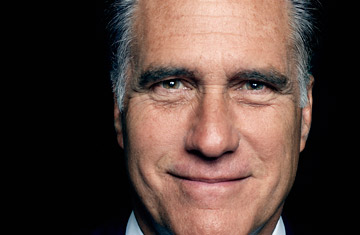
(5 of 11)
"We said, O.K., we're ready to play," he told the backroom workers in 1986. "We come to the door to tell them that, and there are already 20 other people standing in line. The idea was absolutely mobbed by venture capitalists ... Tom had to go through and say, O.K., eeny, meeny, miney, mo--which one of the guys who wants to participate in this idea am I going to bring in to Staples?" Dropping to one knee as he told the story, Romney said it was he, not Stemberg, who had to "assume the appropriate position" as suitor.
Stemberg dismisses this now with a laugh and says Romney is just methodical. "He will run every scenario, the good, the bad and the ugly ... The one thing he's definitely not is a shoot-from-the-hip kind of guy." One particularly revealing measure of Romney's caution, though it is far more common in commerce than government, is the number of times he chose to walk away. "These ideas come by, and that's 250 or so a month," he told the Staples workers, "and we invest in, on average, about 1 in 500 of businesses that come by." Some 3,000 prospects crossed his desk each year, and "we might invest in six companies if we're lucky."
Geoffrey Rehnert, his Bain Capital partner from the start, says one explanation was that "a lot of garbage came in in the early days, like shelf-stable peanut-butter-and-jelly sandwiches, shrimp farms in Ecuador" and fanciful "flying cars that also turned into boats." It was also true, he says, that as Bain Capital grew, Romney oversaw the development of formal policies and structures appropriate for a global operation. "The deal guy he was in 1986 is very different than the CEO of a $10 billion-asset money-management firm" that he became.
Even so, for most of Romney's career, he could afford to be fastidious in the extreme about his quarries, far more so than a government leader or traditional corporate executive of similar rank. He could choose one specimen at a time, dissect it, mount it on a slide and spend days at a time without looking up from the microscope. Rarely do political leaders have that kind of time.
"What I enjoyed most about Bain & Co., the consulting firm, was the analytical process of solving tough problems," Romney told Businessweek recently. "And I love the thinking and the analyzing as much as anything." Later, at Bain Capital, his approach was "similarly analytical, to decide which business ideas really had economic merit and which did not."
A MAN AND HIS ETHICS
Economic merit did not always settle the question. Romney had ethical boundaries that have not been described before in news reports. Some of the unwritten rules fit awkwardly today with the interests of his contributors and target voters. "Mitt was pretty adamant about not making investments in tobacco, firearms," says longtime partner Marc Wolpow.
Several times in the 1990s, distress sales brought leading U.S. gunmakers to market with attractive financial terms. Colt's Manufacturing Co. had been badly damaged by a four-year strike, forcing the state of Connecticut to help stave off bankruptcy in 1990. Two years later, the weaponsmaker went belly up anyway. Rival purchase deals were made and broken until 1994, when new owners arrived. Remington, meanwhile, went on the block in 1993 and again in 1998.
